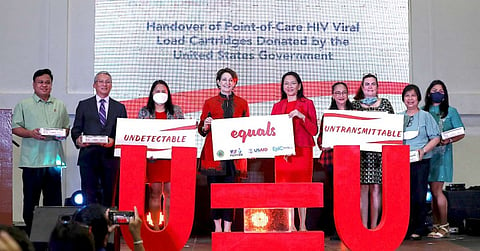
- NEWS
- the EDIT
- COMMENTARY
- BUSINESS
- LIFE
- SHOW
- ACTION
- GLOBAL GOALS
- SNAPS
- DYARYO TIRADA
- MORE

The United States on Thursday donated to the Philippines 86,000 human immunodeficiency virus or HIV load testing cartridges with an estimated value of P85 million.
US Ambassador MaryKay Carlson led the turnover ceremony which coincided with the commemoration of World AIDS Day at the Manila City Hall.
Carlson said the donation is "further proof" that the US government is committed to working with the Philippine government to ensure that people living with HIV in the country have equitable access to viral load testing.
"With this donation, we aim to amplify the hopeful message of U equals U: That undetectable is indeed untransmittable," she said.
Senator Risa Hontiveros, Manila City Councilor for Health Dr. Louisito Chua, Health Undersecretary Carolina Vidal-Taiño, and members of the people living with HIV community were also present at the event.
The donation was secured through the President's Emergency Plan for AIDS Relief and the United States Agency for International Development.
The cartridges will be distributed to HIV treatment hubs and facilities across the Philippines and are expected to cover the country's viral load testing requirements for all patients undergoing HIV treatment for one year.
Health Officer-in-Charge Maria Rosario Vergeire, who represented the Philippine government, expressed her gratitude for the donation which she said will be crucial to the country's provision of HIV services.
"This donation of more than 86,000 viral load cartridges from the United States government will be pivotal to the country's HIV treatment program," Vergeire said.
Latest data from the health department showed 1,347 individuals have tested positive for HIV, a 37 percent increase compared to the same reporting period last year.
The majority or 96 percent of the total reported cases in September 2022 were males.
The age of the reported cases ranged from 2 to 71 years old (median: 28 years). Among newly diagnosed cases, 3 (<1 percent) were less than 15 years old, 418 (31 percent) were 15-24 years old, 667 (50 percent) were 25-34 years old, 229 (17 percent) were 35-49, and 30 (2 percent) were 50 years old and older.
Likewise, the DoH also noted that there were seven HIV-positive women reported pregnant at the time of diagnosis. The age of reported cases ranged from 15 to 38 years old (median: 25 years).
